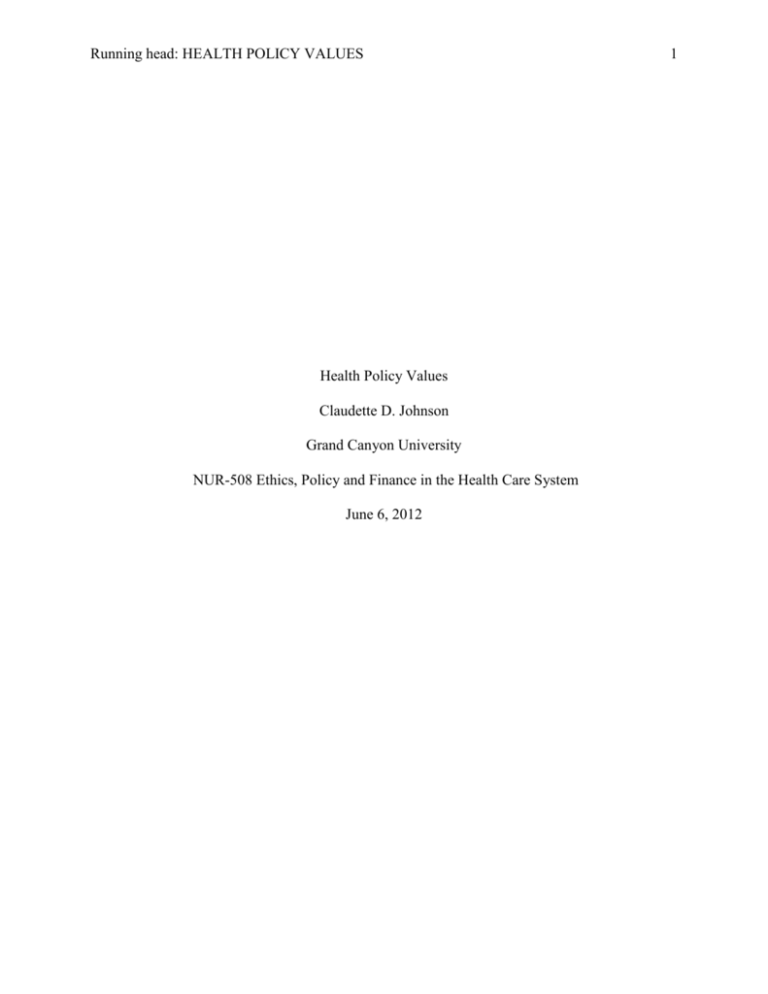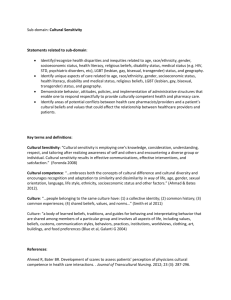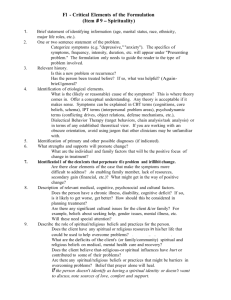Running head: APA TYPING TEMPLATE
advertisement

Running head: HEALTH POLICY VALUES Health Policy Values Claudette D. Johnson Grand Canyon University NUR-508 Ethics, Policy and Finance in the Health Care System June 6, 2012 1 HEALTH POLICY VALUES 2 Health Policy Values Introduction A person’s health can shape a society and health is the central indicator of the social value of a society (Browne, 2001). The World Health Organization (WHO) Constitution (1946) first reflected the concept that the right to health is the highest standard of health (Browne, 2001). This paper will be reflecting on the author’s personal values and beliefs; the effects of beliefs and opinions on health care policy as it relates to cost, quality and social issues; how factors such as family upbringing, spiritual or religious beliefs/doctrine, personal and professional experiences, and political ideology affect your current perspective on health care policy; and discuss inconsistencies in aligning personal values and beliefs with current health policy. Describe your personal values and beliefs. This author’s native country is the Philippines and migrated to the United States of America at age12. Raised in a middle class, conservative, Catholic household, my younger years focused on school, dance, music and church. My dad moved to the U.S. after 5 years of waiting and after he became a citizen, petitioned the rest of the family; wife and 6 children. As practicing Catholics, God was the source of strength, attended mass every Sunday, went to Catholic schools and observed all the Holy holidays. In our teen years, they encouraged us to make choices about church involvement with some of us now not as devote as others. I am a believer but not obsessed if church does not happen on Sundays. My belief in a God has not changed but my outlook on Catholic values has evolved. Abortion was not uttered in our household but as we grew older understand circumstances that can lead people to choose abortion. I am more open-minded. My concept of spirituality is that it is about finding the HEALTH POLICY VALUES 3 balance of values and morals as we take into consideration the benefits to society. I have been told to be analytical and an over thinker. Work ethics and education are high in the agenda in our household. We all started working at the age of 16 and my parents only rewarded 2 things: good grades and good deed (what they called unselfish acts). Professionalism, reliability, optimism and ability to find the balance between homes, work and school life are values this author takes pride on. Working hard and earning my pay are work ethics instilled by my parents. My upbringing has taught me to be willing to help and being respectful of the laws. My parents have often stated that “opportunity will not come to you; you will need to seek it out”. I value sincerity and the truth (it may hurt but it will hurt worst if one would find out later). Beliefs and opinions about health care policy Healthcare is needed by everyone and the price of healthcare is not cheap. The cost for maintaining the health of Americans does not come without a price. I believe the cost of caring for our citizens will either be paid upfront by taxation and promotion of health behaviors or later by the cost of medical care for disease complications. As Americans we need make a decision. However, our government also needs to do self-examination of internal processes to ensure efficiency. People will not mind making concessions in their daily lives if the government is doing the same. Economic irresponsibility Quality of healthcare is a constant concern. Supporters and opponents of health care reform legislation agree that the current growth in health care costs is unsustainable (United States Department of Health & Human Services, 2012). The rationale is that preventive strategies and timely care will lessen illness and lower costs in the long run, but my fear that expanded coverage will only increase the national debt and Medicare and Medicaid and private HEALTH POLICY VALUES 4 insurers, will seek to control spending by rewarding the quality rather than the quantity of care. Under the reformed system, Medicare payments will be tied in part to the quality of care provided, with bonuses given to hospitals and physicians that produce the best outcomes and value for their patients (United States Department of Health & Human Services, 2012). This necessitates hospitals to be more devoted to finding more efficient ways to render quality care. I believe quality is what hospitals should always strive for; mandating can create gaps in healthcare access. I believe as nurses, investment in legislative as well as practice advocacy is a necessity. Health care reform, with its emphasis on rewarding quality and cutting costs, could change the medical care landscape of care is delivered in the U.S. and how we measure quality takes on new urgency. Standardized benchmarks for excellence, quality measurements will have a powerful impact on how we realign our health care system. As nurses, we need to take a lead in finding creative ways to render our care. Inefficiencies in managing supplies and treatments and care should be improved or the status of hospitals and our careers will be compromised. The debate on health is in terms of wealth and economic growth (Browne, 2001). The dispute that monetary progress leads to health implies that an economy needs first to grow and before investing in health. Though others may think that the US has a moral as well as a financial obligation globally (seen by other countries as rich in resources), we also have financial obligations to our own people. In a country so rich, it is hard to understand why we struggle with helping our own. Yet we are used to going to other nation’s aid, partly due to our efforts to maintain the superpower image which in itself has its advantages. More importantly, we are seen as the land of opportunity, with credibility around the world as one who will be fair and just and especially herald to have strong moral values. Holding up to our end of this bargain is not an HEALTH POLICY VALUES 5 issue as long as people, who respect our freedom, also respect the laws we are all accountable to. It is when exceptions are made to those who do not follow the rules that people feel fairness has created a double standard. People are willing to share the cost if they are all financing the cost equally. As a nurse, it is an agonizing dilemma; for caring is the focus of our careers. As a worker in a community hospital, it is even more difficult for even if your heart says no to under privilege, and illegal Immigrants. As one who came from a foreign land, I will say, everyone needs to be legal. As tax payers contributing to the future of my children and to my future care, I have to say we must set limits before they get here. If they set foot in our land and get sick here, it becomes our obligation to now fix the problems we created to occur. Yet we can set limits and enforce the laws we created to preserve our future and our children’s future. Selfish as it is, our nation is struggling to make it (be it our fault due to mismanagement or our inefficiency as a whole). Unlike Risse (2008), who “argues that because resources are not distributed evenly around the globe, it is unjust for those with the good fortune to be born in resource-rich areas like the United States to exclude others from less well-endowed areas from entering the United States to share the wealth, I will add share the wealth after we take care of our own and that includes all who legally immigrate to this country. For if we have the wealth and the means, I am all for sharing but our health care crisis jeopardizes the health of our own countrymen and to me that is what is unjust and unfair. Although health as human right is articulated in every meeting discussing health, the approach to health largely contradicts the principles of human rights. Indeed if health is a human right, then ensuring peoples’ health is by definition a direct responsibility of the state. International aid for health can be debated from many angles, especially if considered from the HEALTH POLICY VALUES 6 human rights-based approach (Kaiser Family Foundation, 2003). It focuses on individuals and blames them for their irresponsible behavior. This authors feels there is joint responsibility and now is not the time to finger point when individuals are suffering – patients without coverage and hospitals with less reimbursement. Spiritual beliefs impact political ideologies and the policy process America is not only the most secular society in the world; it is the most individualistic (Kaiser Family Foundation, 2009). Spirituality defines a more global view of life’s meaning (value of life, peaceful meanings, feeling of hope and such), but religion demands the fulfillment of obligations to God or spiritual being. Spirituality is a more general term that includes religion but that also encompasses the general human impulse to reach out towards the greater whole of which we all are a part (Kaiser Family Foundation. 2003). The difference between religion and spirituality is simply that most religions offer a specific set of beliefs and structures to help people find their innate spirituality. Spirituality’s influences our political ideology (our obligation to society) and our outlook on health. It only does not affect our views on health and wellness but also our views on political advocacy with respect to healthcare reforms. In the State of American Political Ideology (2009), a study of political values and beliefs, the ideological perspective of the Obama health reform was reviewed. It revealed that the President has a 58% approval rating and that the country is progressive more than liberal and that religious coalitions are showing strength in lobbying toward health care issues, launching media campaigns and political rallying in congress. They appeal to the masses in internet ads, television and prayer vigils on healthcare topics. Political decision based on religious reasoning are not wholly beneficial to society as a whole, including all those who do not share the same religion, but a decision based on secular HEALTH POLICY VALUES 7 reasoning can be said to be beneficial to most people on a larger platform than that based on a singular religious belief. As a result, it is alright for religious influence to influence the political decisions of voters; however a political leader cannot make political decisions out of religious influence. It is crucial that he uses secular reasoning over religious reasoning and hence secular and religious influence can influence political decisions, just in asymmetrical proportion. Spirituality affects our decisions in choosing our political leaders as well as supporting political policy. Our value systems along with our spiritual beliefs influence what is important to our daily lives. We want to choose politicians that share our innate beliefs and make policy decisions reflect our values and whose decisions in politics are in alignment with ours. My spirituality is reflected in my decisions with morality being the biggest challenge for me. Factors affecting perspective on health care policy. My family upbringing has built a foundation on seeing things from all prospective. Being multi-cultural, I have seen the best and the worst of both worlds. I have seen and experienced how my country has benefited from the foreign assistance monetarily (tax breaks and resources) and security (military help) assistance from the United States. It has allowed me an opportunity to immigrate to a land of opportunity, if I so desire to take it. Yet the struggle for independence is sometimes tainted by loyalty. Thus, decisions are made to compromise my homelands benefits to keep alliances with more powerful countries intact. Like everything else in life, negotiations need to happen and priorities need to be identified for what benefits the most. My strong spiritual and religious beliefs are intact but I also know that the universe or our nation is constantly changing. Change is not always bad and can be invigorating to those it affects: be it financial, emotional or physical. As human beings and as professionals, we have to evolve with the times. Though issues such as abortions were not even mentioned in the HEALTH POLICY VALUES 8 conservative world I have lived in, it now has opened doors for conversation and consideration and understanding of another person’s predicament such as in rape. In view of healthcare, I feel my professional experience has a strong influence in my changing direction and my desire to be overly involved. I think of passiveness as a paralyzing negative factor. Heightened awareness in many aspects of politics helps me stay abreast of the changes in a profession I have a passion for. I believe that we can only change what we know and control. Inconsistencies The issue I have is in the Obama Administration mandating taxation as a solution to everything. I feel internal analysis and internal efficiency assessment and intervention should be primary. The imposition of some aspect of the policy such as mandate of religious employers, schools and hospital including charities is a violation of first amendment rights and liberty of establishment you render free care for the public in deep need for the free assistance. The consequences of ill health are devastating for many families across the world, throwing many families in a medical-poverty trap (Center for American Progress, 2009). The reason for universal health care insurance is to make it affordable for all. At the same time, access to affordable, quality care is essential for all. The financial solutions should be considered from a redistributive justice perspective (Center for American Progress, 2009). Health as human right transforms to possible solutions. Redistributive justice ought to apply to other contentious issues such as debt cancellation and such. The drive is to render holistic health yet compromises in rendering the ideal care has been compromised by the many variations in the issues from many prospective. The discourse requires the integration of one’s value ideology and policy making. A challenge when every HEALTH POLICY VALUES 9 person has a different meaning to different people. We find ourselves asking: How will we treat people? Whose responsibility is health care? How will we finance health? (Center for American Progress, 2009). Getting started in the right direction is the hardest first step, but this author believes compromises in values and principle may be necessary. Conclusion Health as human right is not argued by many but the approach to respect that right could not be more different. Our nation is in the midst of a healthcare crisis even with advancement of technology, wealth and financial challenges. Cry for ill politics are thrown here and there. The insistence of health for all requires creative thinking and policy making. It forces the government to have a political approach which can infringe on the autonomy and human right. Health care is a crucial agenda requiring mobilization by many to make a difference in for the future. Personal values affect our advocacy for our legislation and our causes and as professionals we should have our voices heard. HEALTH POLICY VALUES 10 References Browne, A. J. (2001). The influence of liberal political ideology on nursing science. Nursing Inquiry. 8(2). 118-129. Retrieved from http://www.ncbi.nlm.nih.gov/pubmed/11882210 Center for American Progress. (2009). State of American political ideology, 2009: A national study of values and beliefs. Retrieved from http://www.americanprogress.org/issues/2009/03/political_ideology.html Centers for Medicare & Medicaid Services. (2012). Keeping America Healthy. Medicaid.gov. Retrieved from http://www.medicaid.gov/AffordableCareAct/Provisions/Eligibility.htm Federal for Immigration Reform (FAIR). (2011, December). Immigration Issues: Facts. Retrieved from http://www.fairus.org/issue/how-many-illegal-immigrants Kaiser Family Foundation. (2003, August). The Kaiser Commission on Medicaid and the uninsured. Retrieved from http://www.kff.org/uninsured/upload/Immigrants-Health-CareCoverage-and-Access-fact-sheet.pdf Kaiser Family Foundation. (2009, December). Focus on health Reform: Immigrants health Coverage and health Reform. Kaiser Commission Report. Retrieved from http://www.kff.org/healthreform/upload/7982.pdf Risse, M. (2008). On the Morality of Immigration. Ethics & International Affairs: Carnegie Council. 22(1). Retrieved http://www.carnegiecouncil.org/resources/ethics_online/index.html United States Department of Health & Human Services. (2012, May). Take health care into your own hands. Retrieved from http://www.healthcare.gov/law/timeline/index.html






